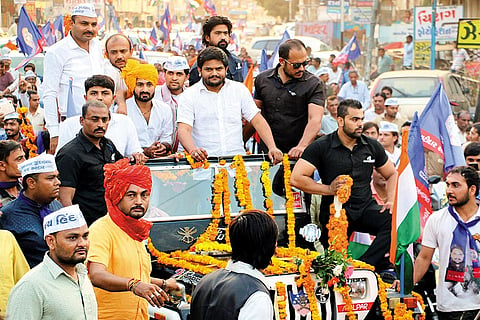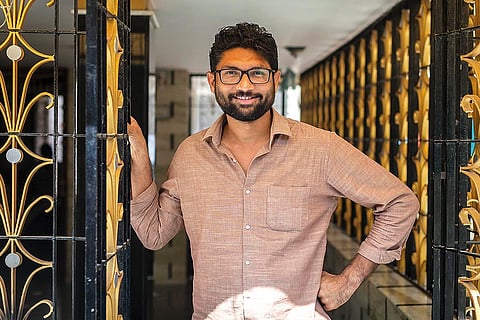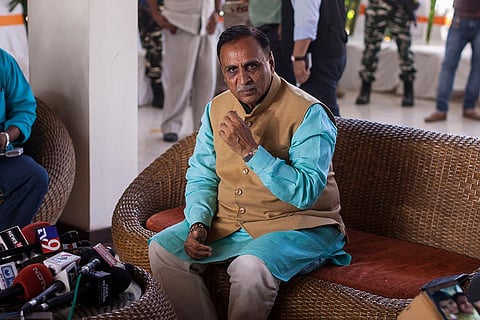For the young and the restless, these are interesting times in Gujarat. Hardik Patel, the popular face of the Patidar Anamat Andolan Samiti, is holding public meetings and dodging arrest warrants—and perhaps even dodging the draft big parties are seeking to get him interested in. Emerging Dalit voice Jignesh Mevani has been on the road too and is busy talking to the media on his political strategies and consolidation of Dalit votes. OBC leader Alpesh Thakor has recently joined the Congress and is either sharing the dais with Rahul Gandhi or putting forth his views on TV channels with unending zeal and gusto.
Three-Legged Rebellion
After 22 years of BJP, there’s a generation in Gujarat that hasn’t seen anything else. But are the dissenters strong enough—and cohesive?
After being in power for 22 years, the BJP is strategising to fight anti-incumbency and consolidation of Dalit, Patidar and OBC groups represented by Mevani, Hardik and Thakor respectively—though in which direction each may be mobile is still up in the air. They are also dealing with a rather spirited Congress, which seems to have got a fresh lease of life after the hard-fought Rajya Sabha election of Ahmed Patel and officially inducting Thakor, who has been fighting for better implementation of prohibition laws among other things for the past few years.
Not to mention the newly energised and aggressive Rahul Gandhi, rallying actively in Gujarat. The new party of Shankersingh Vaghela, who earlier this year added one more chapter to his history of rebellions by quitting the Congress, may split some votes but that has done nothing to dampen the spirit. The young turks are all the rage now and speculation is rife over the impact they may have on the chances of the Congress improving its tally in the December election to the 182-seat Gujarat assembly, for long the unquestioned natural turf of the BJP.

“Spring ko bahot dabaya hai. Nothing has been done for the people for 25 years, neither for the farmers nor for the traders. If people protest, they are threatened, they are jailed.”
“Spring ko bahot dabaya hai…spring has been suppressed for too long,” says Hardik Patel who, at 24, is too young to contest elections. “Nothing has been done for the people for 25 years, neither for the farmers nor for the traders. If people protest, they are threatened, they are jailed. If businessmen protest, there are raids by the ED (Enforcement Directorate). Corruption is rampant. One has to pay lakhs to get government jobs. This has to change. If there’s a viable political alternative, things will change.”
For the establishment, Hardik emerged as a disturbing figure of dissent when he led the Patidar agitation for reservations two years ago. He was jailed and termed anti-national. Over these months, support for his agitation has grown and he is now said to be the most important factor in swinging Patidar votes—though he is non-committal on which way it will be. Nor is there clarity on how reservations can be given—whether based on economic status or caste. The question is technically as difficult as it is for the Marathas in Maharashtra—an analogous group, politically dominant, but feeling considerable socio-economic strain among its rural sub-elite.
“There is a reason for the emergence of the three young leaders. The youth are fed up with the central and state government,” says senior Congress leader Arjun Modhwadia. “BJP leaders are disconnected from the grassroots. The econ-omy has collapsed. Traditionally, the Jan Sangh was supported by small traders and the middle class. Patels haven’t voted for the Congress in the recent past. Now they have revolted against the BJP.”
An eager Congress opened its arms for a full embrace of the three leaders. Hearteningly for it, instead of floating a third front or individual political parties, Thakor officially joined the party and Mevani has appealed to his followers to vote out the BJP, making Congress that much stronger. Talks with Hardik, however, have proved inconclusive, with mixed signals emanating from him and some churning among his lieutenants. And yet, even these are signs of rare vitality in the usually tepid waters of Gujarat Congress politics.

“The BJP is trying very hard to brand the resistance as a caste issue but all three of us represent different sections of the poor and deprived. It’s not going to work.”
Only in the past few months has it started to take on the BJP—be it on the reported unprecedented rise of Jay Shah’s company or the delay in the announcement of election dates. Its new verve matches the angry, rebellious mood on the ground—what with the viral #VikasGandoThayoChhe (Development has gone crazy) campaign online, the youth demanding jobs, farmers asking for better support prices, traders complaining about GST and demonetisation (see box), Dalits sustaining their anger after the Una agitation, or just plain anti-incumbency. Cumulatively, enough to cause some nervous anxiety in the BJP.
However, it will be the traditionally pro-BJP Patidars—comprising farmers as well as traders—who may tilt the balance. Hardik is the big X-factor here. “Traditionally Dalits and OBCs have voted for Congress but Patels have always supported the BJP. That’s why our struggle and protest will be crucial in voting patterns,” says Hardik. Not surprisingly, he’s being kept busy on several fronts: from a non-bailable warrant for old incidents of violence and defections from his movement to him issuing a November 3 ultimatum to the Congress to take a clear stand on quota for Patels.
The Congress, on its part, has offered a 20 per cent general quota on economic grounds, not an OBC one for Patels—so one key dynamic in the unfolding picture is the potential conflict over the quota turf between Patidar interests and those of the Thakor-led OBCs (who are 40-45 per cent of Gujarat’s population; Patels are only 12-14 per cent). Given Hardik’s angrily anti-BJP but non-committal stance on joining, the Congress may see value in not giving in to the bargain too easily.
But all of this represents a churn in Modi’s Gujarat. “For the first time, a questioning process has started since the Patidar agitation. The younger generation has only seen the BJP in power. Interestingly, the Congress has never tried to mobilise the Patidars. There are no elections in the university and student mobilisation has not happened. Even the Dalits, at seven per cent of the population, had been dispersed till now. Only now has a consolidation of identity happened across the state,” says Gaurang Jani, sociologist, Gujarat University.

“Growth here has simply not been inclusive. People from every walk of life have been agitating: Dalits, Patidars, farmers. The growing fascism needs to be dealt with and people are realising that.”
Despite all this, according to several opinion polls, the BJP is still set to win Gujarat, with a 10 per cent gap in voteshare over the Congress—the BJP itself is, perhaps rhetorically, targeting a seat tally of over 150. To win a 182-seat assembly, a party or coalition needs 92 seats. For a comparison, the Congress had won 60 in 2012, with a steady and loyal votebase that has never dipped too much. However, neither party has been able to float a second rung of leaders or announce a chief ministerial candidate—a trend popularised by Modi himself.
Meanwhile, tick all the usual tricks from the Indian election playbook. PM Modi announced several infrastructure projects recently and is likely to address 50 rallies. Analysts anticipate communal/caste cards to be played aggressively as campaigning starts. Twitter was ablaze as Ahmed Patel was sought to be linked to the recent arrests of two youths with alleged ISIS links—and a CBI/ED dragnet closed in on the Sterling Biotech bank fraud case that turned on the heat from another side too. Defections, sting operations and horse-trading have also begun well before candidates’ lists have been finalised.
The BJP makes light of all the agitations. “It will have no impact at all,” says chief minister Vijay Rupani. “Even when the agitations were going on, we said they were politically motivated and supported by the Congress. It was done to bring a bad name to Modiji and the BJP government in Gujarat. The Congress is unable to win elections on its own, that’s why they got all this done. Now it’s proven because Alpesh has joined Congress and Hardik is talking to Rahul Gandhi on the sly, trying to make a deal, and Congress has offered Jignesh a ticket. All three have the same appeal—to help Congress win and make BJP lose. They were politically motivated after all.”
That may not cut much ice with the protesters or the opposition. “The BJP is trying very hard to brand the resistance as a caste issue but all three of us represent different sections of the poor and deprived. Basically the BJP is the one that has played the communal card and now it’s trying to give a caste colour to our agitations. It’s not going to work,” says Alpesh Thakor.
The hitherto happy ‘Gujarat story’ was ruptured by the post-Una Dalit agitation. “Growth here has simply not been inclusive. People from every walk of life have been agitating: anganwadi workers, traders, Dalits, Patidars, farmers. Moreover, the growing fascism needs to be dealt with and people are realising that,” says Jignesh Mevani. “Different groups are forgetting contradictions to come together to defeat the fascist tendencies. The RSS is a different battle but defeating the BJP in Gujarat will play a vital role in 2019. It is for this reason that I am ready for ideological compromises. How long will they win on the basis of empty rhetoric?” he asks.

None of this means a sure-shot defeat for the BJP. Scratch the surface and the majority of urban middle class voters—unaffected by the beef ban and largely secure from the perils of DeMo/GST—continues to believe in the Modi model of development (and Congress incompetence). Sociologists point to the extent of polarisation: minorities are not a part of the narrative at all. Sustaining this consensus are both effective marketing and urban development.
“Look at Surat city in the past 20 years, it has improved a lot. The roads are so good. Even measures such as GST will help in the long run. If they weed out the culture of illegal and unauthorised trade, it’s a good thing,” says management consultant Mukul Goyal, who’s part of a youth group called Global Shapers. Gujarat, with a large number of cities and a huge urban population, lends itself to further urbanisation and corporatisation.
It’s clear that, despite disappointments, the Modi narrative is not lost entirely. Kaushik Upadhyay, a cotton farmer, says the situation of farmers is as bad in Gujarat as in states like Maharashtra but they are not voicing it. “I don’t think our children can do farming for livelihood but even to study or get jobs they have to go out of Gujarat. Despite announcements, we don’t get the zero per cent loans. I still believe Modi is a good leader but I don’t have faith in the party or the state leaders anymore.”
Here lies the strategic challenge for Modi. Unlike Parrikar in Goa, he cannot promise a return just to win one more time. Posters saying ‘Hun Chu Vikas, Hun Chu Gujarat’ (I’m development, I’m Gujarat) are dotted around cities—it’s meant to be the citizen’s voice but Modi towers over other leaders on all hoardings. The taglines are becoming fodder for memes and online jokes. People have also started to sift through old social media bombarding. “One has to see through the promises that were made and delivered. I have started asking my family and friends on WhatsApp groups to do some fact-finding. I follow communication on Facebook and look for diverse views,” says Tejas Desai, a consultant for SMEs.
The fight is between a waning but still potent Modi-Shah duo and a surging, if still internally incoherent alternative force veering towards the Congress umbrella. For the next month-and-half, Gujarat’s political leaders will be on their toes. “Is baar sochke vote dalenge,” says a textile unit owner. “That’s the difference. I don’t know about the outcome but this time people will think and vote.”
By Prachi Pinglay-Plumber in Ahmedabad and Surat